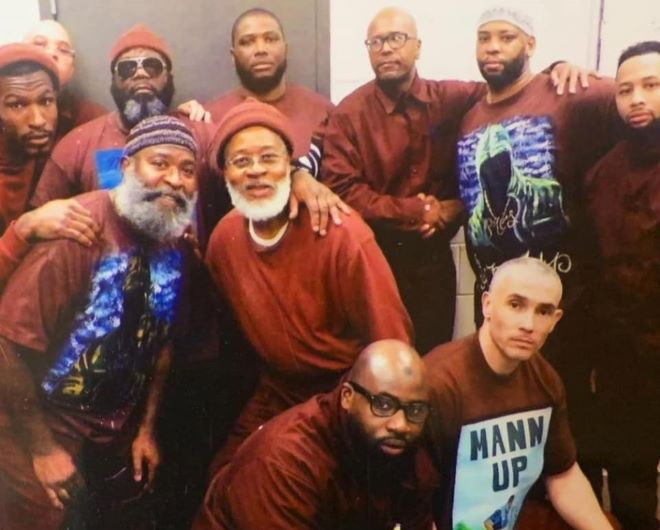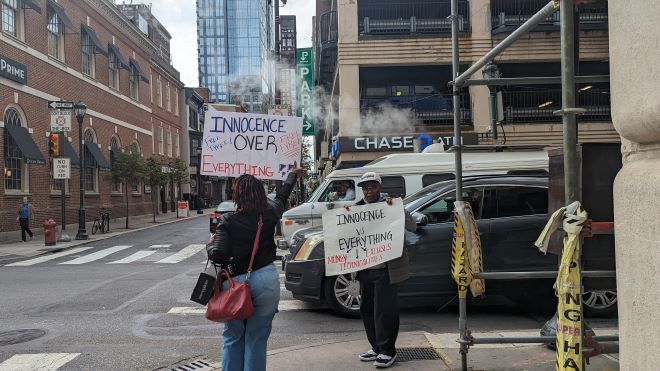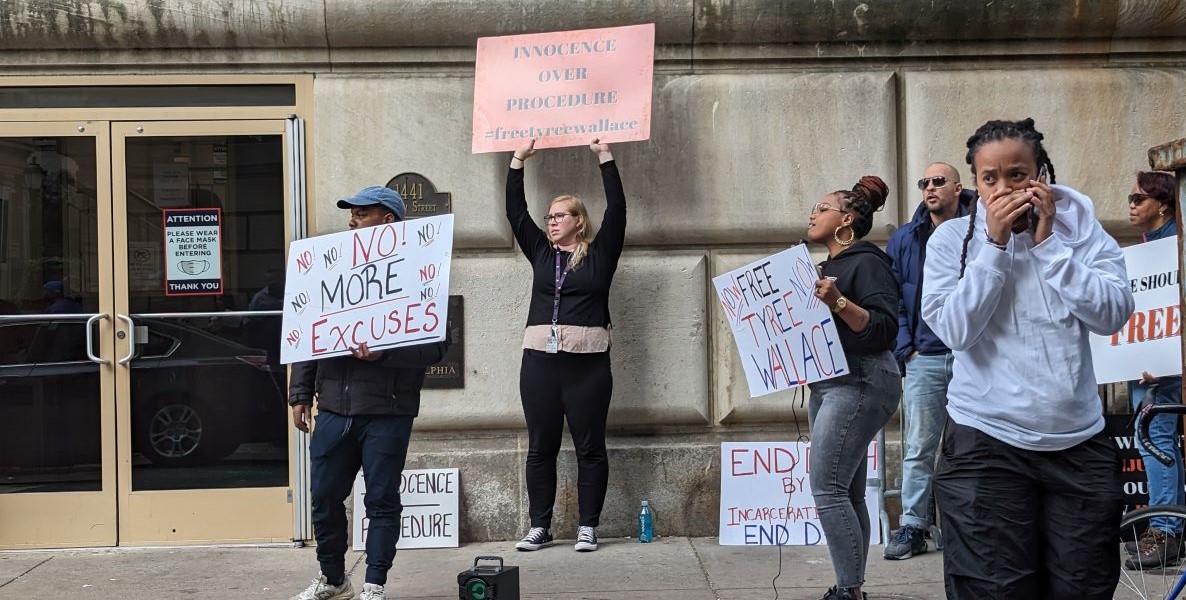Tyree Wallace appears on a Zoom window against a beige cinder block wall wearing a maroon prison jumper and a knitted kufi. He is congenial, smiling, even laughing at times — not what you expect from a man who has been imprisoned for 26 years.
In 1999, a jury convicted Wallace of second-degree murder and related charges for the October 27, 1997 murder of Jhon Su Kang, owner of Point Breeze’s Salt & Pepper Deli. Alongside a 17-year-old co-defendant, Wallace was sentenced to life in prison, while another defendant pled to lesser murder charges. There was no physical evidence tying Wallace to the crime: no fingerprints, no weapon nor ballistics, no footage, no DNA, no recovered money. The prosecution’s entire case was three witnesses. In the years following the murder of Mr. Jhon, all three witnesses have recanted.
Wallace has always maintained he had nothing to do with the crime, and has spent years trying to appeal through the courts. Now, new developments in his case — including potential testimony of a co-defendant and a major filing seeking post-conviction relief — have provided some hope that he may soon come home.
Actual innocence
At the time of Jhon’s murder, Wallace was a 19-year-old who had occasional brushes with the law. He also knew the victim well. When he discusses his case, he makes a point to remind people who Jhon was. “He was a giant in the community,” Wallace explains. “He hired from the neighborhood, and if he saw you were hungry, he would feed you.” He says it adds insult to injury that he was convicted of killing a man he admired so much.
A few things happen the moment the gavel cements the word “guilty” into the court record. First, even if you didn’t factually commit the crime, you lose the presumption of innocence. At the same time, a clock begins ticking. Most criminal appeals must be filed within 30 days, although the Pennsylvania Post Conviction Relief Act (PCRA) allows people to challenge their conviction or sentence for up to one year after judgment when direct appeals have been denied for issues like ineffective counsel, violation of constitutional rights, or legal errors committed during the trial, with narrow exceptions.
“I don’t want people not to think that I’m angry. Anger is a motivating factor. Some of the best things in the history of this world have taken place because people were angry. It’s just a question of what do we do with that anger? Do we channel it into positivity?” — Tyree Wallace
If the convicted have exculpatory evidence, it must be newly discovered, meaning it wasn’t known at trial and would have affected the outcome. All of these processes are time-consuming and require knowledge and resources beyond most inmates — generally limited to the prison library and letter writing. Wallace filed several PCRA petitions on his own, which were denied based on procedural and technical flaws.
In 2008, Wallace was able to get the attention of the PA Innocence Project, which agreed to investigate his case. Project attorneys uncovered witnesses that contradicted the trial testimony. They also documented alleged misconduct by the police and prosecution in weeding out witnesses that cleared Wallace and convincing others to testify against him — witnesses that subsequently cited police intimidation in producing their testimony as well as pressure from prosecutors promising deals on other pending cases.
One of those witnesses, Brian Brooks, approached Sheriff John Hamilton in the courtroom immediately after testifying in 1999, asking what the penalty for perjury was, admitting he had just lied on the stand. Wallace’s court-appointed attorney, who didn’t pursue witnesses or further investigate on his client’s behalf, called for a mistrial, but the motion was denied, and the prosecution stated in its closing that the witness recanted “out of fear.”
The documentation of Brook’s statements during the investigation and circumstances of his cooperation were never provided to the defense and have since gone “missing,” per the District Attorney’s office. The prosecutor in Wallace’s case, then-Assistant District Attorney Yvonne Ruiz, was one of 33 fired by District Attorney Larry Krasner in 2018. One of the detectives who had worked on the investigation into Mr. Jhon’s death, Jeffrey Piree, was one of several officers named in now-exonerated John Miller’s lawsuit alleging police misconduct in a case where he was sentenced to life for a crime for which he was ultimately cleared.
This is where the institution of our justice system collides with the individuals responsible for completing the work necessary within that system: It’s not designed to account for bad actors.
Estimates of wrongful convictions in the U.S. vary from 6 percent to nearly 12 percent. The most common causes are faulty eyewitnesses, mistakes in the processing or preservation of forensic evidence, prosecutorial or police misconduct, ineffective counsel, and false confessions. While overturning a wrongful conviction has been more common in the last two decades thanks to DNA testing, in cases where there was no physical evidence to begin with, the process is much more difficult. The burden is on the convicted and their supporters to uncover new witnesses, root out corruption, and devote resources to investigating and locating potential new evidence.
The racial component of wrongful convictions cannot be overstated. Black Americans make up 13.6 percent of the population, yet account for 38 percent of incarcerated Americans. In the 2022 National Registry of Exonerations report, a joint project of University of California Irvine, Newkirk Center for Science & Society, University of Michigan Law School, and Michigan State University College of Law, 53 percent of all 3,200 known U.S. exonerations between 1989 and 2022 were of Black people.
“What absolutely floors me is everything he has done and is doing to try and better himself and better his fellow inmates. He’s a mensch, he really is.” — Michael Barkann
Good citizenship from behind bars
In the years since his incarceration and fight to overturn his conviction, Wallace’s mother and father both passed away. Despite everything, behind bars, Wallace has channeled his energy into practicing good citizenship within a society from which he cannot share the benefits. He is using his time to not just fight for his own freedom, but also to advocate for his fellow inmates and resolve the issues plaguing the criminal justice system.
“I don’t want people not to think that I’m angry,” Wallace says. “Anger is a motivating factor. Some of the best things in the history of this world have taken place because people were angry. It’s just a question of what do we do with that anger? Do we channel it into positivity?”
His time volunteering for inmates in hospice care behind bars has inspired his advocacy for ending life-without-parole sentences through the chapter of the Pennsylvania Lifers Association he co-founded while incarcerated at SCI Huntingdon. Pennsylvania has the second-highest number of permanently imprisoned individuals in the country. Lifers lack access to the automatic appeals that inmates with death sentences have. Rehabilitation efforts are scarce. Compassionate release, for the elderly and/or ill, is rare.
After transferring to SCI Phoenix in 2018, Wallace and fellow inmate Anthony Sutton co-founded Mann Up to assist men preparing for release to successfully acclimate to civilian life again. The program employs peer support, trauma-informed group therapy, workshops and mentoring on the inside and continued guidance with help from the nonprofit Institute for Community Justice outside. Many of the formerly incarcerated Mann Up participants are engaged in their community as Block Captains and activists.

He also founded SRC (Systemic Reformative Change Organization), which has an ambitious civil rights and criminal justice reform agenda that includes specific legislative items like abolishing the felony murder statute, removing the time bar for criminal appeals and legalizing marijuana, to broader reforms like dismantling the school-to-prison pipeline and justice equity for incarcerated women.
Wallace credits his activism to his grandmother and father, who both volunteered their time for their communities. “It’s kinda in my DNA,” he says.
Where does Wallace’s case stand today?
Wallace’s current representation includes David Perry of Blank Rome, a firm that usually handles business law. He learned about the case when the PA Innocence Project reached out to him to answer questions Wallace had about establishing Mann Up in 2018. Keir Bradford-Grey, a trial attorney who’s currently running to be the state Attorney General, joined the team soon after.
Present at the Free Tyree Wallace Rally at Philadelphia City Hall on September 29 were Norristown Councilwoman Heather Lewis, activists Terrance Tykeem, B McFly, and Kashif Jones, therapist Akea Williams, as well as friends, family, and attorneys for Wallace. This group, along with somewhat unlikely Philebrity Michael Barkann, the local NBC sports anchor and reporter for NBC Sports Philadelphia and former co-host of “Mike and Ike,” called on Philadelphia District Attorney Larry Krasner to act on Wallace’s case.
Efforts to right wrongs within the justice system can succeed: In early November, three Philadelphia men were exonerated on the same day. The Conviction Integrity Unit, established by Krasner in 2018, reviews problematic convictions and sentencing. More than 25 people have been exonerated since its inception, the overwhelming majority the outcome of misconduct on the part of prosecutors and police, including Brady violations, which occur when a prosecutor fails to provide the defense with evidence that is favorable or potentially exculpatory, as with the Brooks testimony in Wallace’s case. However, the level of advocacy and attention that the wrongfully convicted and incarcerated require is not attainable by every inmate.
Barkann, much better known for his Phillies commentary and blue-framed eyeglasses than, say, criminal justice reform, learned about Wallace’s case over dinner with Perry. “It’s outrageous to me. Everybody knows that he’s innocent,” says Barkann. “The bottom line to me is this poor man was wrongfully convicted. What absolutely floors me is everything he has done and is doing to try and better himself and better his fellow inmates. He’s a mensch, he really is. How he holds his head up high, how he maintains calm, how he’s cheerful and joyous, he’s just a beautiful person. And when you do talk to him over a period of time and you realize he’s not free, it really breaks your heart.”
At a subsequent rally held in front of the public defender’s office on November 17, Wallace’s supporters demanded action on another recent development. Raheem Shackelford, who was 17 when convicted, was paroled from prison following several U.S. Supreme Court decisions that eliminated life sentences for juveniles. He has offered testimony that clears Wallace and has enlisted a public defender as, technically, he could be admitting to perjury and therefore violating his parole. However, no affidavit has been filed yet.

On December 4, Wallace’s legal team filed a PCRA petition with the Court of Common Pleas of Philadelphia County, summarizing the elements of their bid to overturn Wallace’s conviction: the Brady violations, the witnesses recanting, the lack of any physical evidence and the co-defendant’s potential testimony. They are seeking a new trial or at least an order for an evidentiary hearing. Alternatively, Wallace petitioned the Board of Pardons for clemency in 2020 with the help of the PA Innocence Project. If granted, clemency would release him from prison, even if it doesn’t clear his name. The hearing on the petition in the Court of Common Pleas is scheduled for February 2024.
When asked what his plans are for when he returns home, he spoke at length about his goals, but also strikingly defined the kind of activism Philadelphia can expect. “I think in really grandiose terms. They say change takes time, it happens slowly and incrementally, right?” he says. “I don’t like that I have to do that. And it’s prison that makes me do that. I am more of a quantum leap type of guy, as opposed to increments. Once the restrictions in this place get removed from me, I am going to embrace that fully.”
Wallace is making it his life’s mission to reform how the Department of Corrections operates. He wants all inmates to have access to education, skill training, and savings accounts. He wants humane medical and mental health care and accountability for the treatment of incarcerated individuals.
“People get released from state prisons every year. And they are coming to everywhere, USA. They’re not just going into the inner city,” he explains. “So the question is, what type of men and women do you want released to your communities?”
![]() MORE ON CRIMINAL JUSTICE FROM THE CITIZEN
MORE ON CRIMINAL JUSTICE FROM THE CITIZEN



